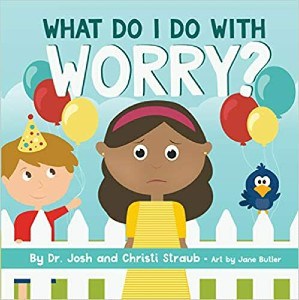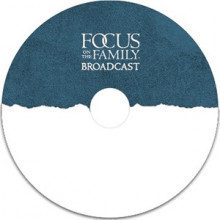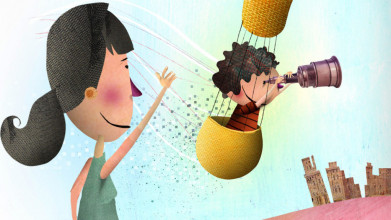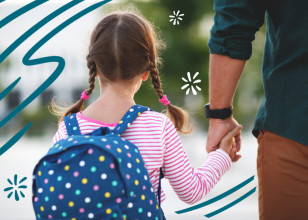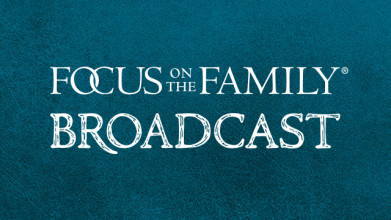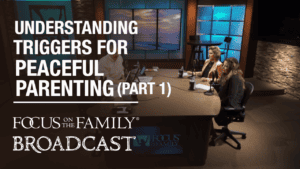Christi Straub: It’s not that we want to prevent our kids from entering these worrisome environments. It’s that we want to equip them and also give them the language that they know how to handle it.
John Fuller: That’s Christi Straub, describing what can be a difficult issue for parents, and navigating worry with your children. Christi and her husband, Dr. Josh Straub, joined us earlier this year to discuss common worries that kids face, and this program became one of our most popular of the year. This is Focus on the Family with Jim Daly, and I’m John Fuller.
Jim Daly: Well, it’s been great reviewing so many Best Of programs this month, hasn’t it, John?
John: It has been, yes.
Jim: (laughs).
John: Makes it a treasure trove of resources.
Jim: Well, I’ve been encouraged and inspired by the great guests and topics we featured over the last 12 months, and Josh and Christi are no exception. They bring wonderful passion and expertise to parenting young children, and I think they’ve really found their niche in helping families develop and maintain emotional stability in their homes. Obviously, this topic of kids and worry, uh, resonated with our listeners, which is why we’re sharing this great content again today.
John: Mm-hmm. Yeah, and Josh and Christi are authors, speakers, and co-founders of Famous at Home, which trains leaders in emotional intelligence and promotes healthy families. They’ve written a great little kids book called What Do I Do with Worry? And you’ll hear more about that today. Jim, here’s how you welcomed the guests on this Best Of edition of Focus on the Family.
Jim: Josh and Christi, welcome back. It’s so good to see you.
Christi: Thanks for having us.
Jim: Yeah.
Dr. Josh Straub: Yes.
Christi: We love to be here.
Dr. Straub: Always an honor.
Jim: What- what a great, uh, theme. You know, we’re, uh, we’re kind of coming out of a turbulent time with the-
Christi: Yeah.
Jim: … pandemic and all.
Christi: Yeah.
Jim: And, uh, y- let’s start there. Um, that fear that children are feeling right now generally, um, how do you go about parenting that?
Dr. Straub: Yeah. It’s a big, loaded question. Uh, I think, you know, one of the most important factors is being able to look at identifying in your children maybe, um, changes in behavior, patterns that have changed over time in your children’s behavior, and- and- and this is what we have to become students of our kids.
Jim: Mm-hmm.
Dr. Straub: Because every child is different and every child manages their emotions differently. For example, you might have some children who just withdraw and they h- they go into hiding, you know. It’s like they- they become more quiet. Uh, other kids might be on the other end of the spectrum and they start acting out. And your- you think that it’s behavioral. You think that they’re being defiant.
Christi: Mm-hmm.
Dr. Straub: You think that they’re, uh, you know, disrespecting you, when the reality is, is that underneath that, there’s something deeper going on. And then most of us, I think in the middle of this, is you might just start seeing, you know, changes with school, changes with the way that they’re interacting with their, you know, uh, peers at school, grades, uh, the schoolwork, and- and they withdraw. And so there’s a lot of different ways, but you have to be able to, and I think this is where as parents, we have to become students of our kids to kind of pay attention to that. And in the busy world that we live in, we as parents also have those fears.
Jim: Right.
Dr. Straub: So, you know, you’re asking how- how, as parents, how do we, how do we parent this? Um, ultimately we can get to this, I think it starts with us as parents. We have to figure out how to be managing our own fear so that we’re not, uh, super imposing our own fears onto our kids.
Jim: Boy, that’s so true. Christi, uh, your son Landon was starting a new school, and he wasn’t acting like himself. Completely understandable. All the-
Christi: Yeah.
Jim: … anxiety of having to make new friends and what will people think of me. I mean, I can get that. I went to seven different elementary schools growing up.
Christi: Oh, wow.
Jim: In six years. So, I mean, so I get that-
Christi: Yes.
Jim: … transition anxiety.
Christi: Yeah.
Jim: I think it did help me to be more of a people person, ironically.
Christi: Mm-hmm.
Jim: ‘Cause I had to make friends, you know.
Dr. Straub: Mm-hmm.
Jim: Every year was a new class, a new school. And, uh, but speak to your son Landon’s anxieties. How did, how did you figure out what was going on underneath the surface?
Christi: Yeah. And I think, Jim, like, just like you’re saying, I think often we look at worry as if it’s this big scary thing. Even as parents, we don’t want to see it in our kids.
Jim: Right.
Christi: Like we want them to walk and be confident. You know, you know who you are. We’re trying to establish, you know, wh- who they are in God, and right, and in this i- identity in them, but worry is just a normal part of life.
Jim: Mmm.
Christi: Like we have to understand as parents, if we have a fear, anxiety, or a worry script going on in our own heads, when we see it in our kids, we feel it magnified. It feels worse to us. For a child, they could just be experiencing a normal fear. Going to a new school, that’s a normal worry. Like and also it’s building in us things like you’ve just said. You learned how to adapt in social situations. It’s not that we want to prevent our kids from entering these worrisome environments.
Jim: Yeah.
Christi: It’s that we want to equip them and also give them the language that they know how to handle it. And so for Landon, when he started going to this school, we noticed it was, it was coming out behaviorally. And so you will see, like sometimes, and we talk about in What Do I Do with Worry?, uh, what ifs, right. Where the question always starts with what if, and it’s where our mind starts spinning and we go down, you know, the end of the- the road of like, well what if, what if the teacher doesn’t like me or what if I don’t have friends or what if I walk in and I- I forget the kid’s name? What if I don’t have anyone to sit with at the lunch table?
And if- if we don’t pay attention as parents, y- you start to realize, our kids, and- and so often I think, their worries are not what we assume them to be.
Jim: Right.
Christi: They’re actually very different-
Jim: Right.
Christi: … than the things that we might assume they’re worried about. And that’s where, like Josh is saying, it’s just being a student to be, and to lean in and to just ask the right questions to get beneath it really.
Jim: Yeah.
Christi: Because for Landon, we realized, some of those insecurities for him were so, I mean, it- it, you almost want to laugh in- in some ways-
Jim: Sure.
Christi: … at what some of the- the fears are.
Jim: Well, and one of the things you’re stressing and I want to stress even further, y- y, being that student of your child.
Christi: Mmm.
Jim: Um, I think that’s so critical. And in our adult business, you know, we- we can go right by that and we just think it’s behavioral, and then we respond to that. You know, “Go to your room for the next hour,” or some kind of disciplinary issue.
Christi: Mm-hmm.
Jim: And we’re really missing the deeper cry of our child’s heart.
Christi: Right.
Dr. Straub: Yeah.
Jim: And that- that then can set you up-
Christi: Yeah.
Jim: … for a disastrous relationship with your kids, ’cause then they’re- they’re not knowing if they can trust you.
Christi: Yeah.
Jim: And even if they can’t articulate it, you- you have to be the adult to say, “Okay, let’s talk about this. What are you feeling? What’s going on in your life right now?”
Christi: Yeah.
Jim: But it takes time to do that. You’ve got to slow down and talk.
Christi: And I think too, we can’t be afraid of what we’re gonna find.
Dr. Straub: Mmm.
Christi: I think so often, parents ignore it because we’re afraid of what’s going on underneath.
Jim: Well, certainly by age.
Christi: Yes.
Jim: I mean, you have that conversation with a teenager-
Christi: Yeah.
Jim: … it’s different than with your five-year-old.
Christi: Exactly.
Jim: Let’s talk about that.
Dr. Straub: Yeah.
Jim: What are some of those signs that you see by age and stage, if I could say it that way? You know, in a five-year-old, what are signs? Maybe then at 10, 12-year-old, and then a 15-year-old?
Dr. Straub: Yeah, great question. And I think, you know, um, and I want to speak to this even as adults because how- how we manifest fear as adults too, you know, ’cause it-
Jim: Yeah.
Dr. Straub: … it, developmentally, you know, it goes on.
Jim: Well, these are, uh … Let me ask you.
Dr. Straub: Yeah.
Jim: I mean, you’re a PhD. Uh, these are, uh, patterns that are developed in your childhood-
Dr. Straub: Yeah, mm-hmm.
Jim: … that you will carry into adulthood-
Dr. Straub: 100%.
Jim: … if you’re not taught or you don’t learn-
Dr. Straub: When we suppress emotion.
Jim: … how to manage them.
Dr. Straub: You can’t suppress … You know, it’s- it’s interesting. Uh, Solomon wrote this in Proverbs 24. He said, uh, “Patience is better than power and controlling one’s emotions than capturing a city.”
Jim: Huh.
Dr. Straub: You know. And the idea there is if you can’t identify your emotion, you know, it’s gonna have control of you.
Jim: Right.
Dr. Straub: And so, you know, it doesn’t mean that, you know, I think we’re, as parents, we’re so afraid, as Christi was saying earlier, of what’s really gonna come out.
Christi: Mm-hmm.
Dr. Straub: And it’s like, oh, if we ask, we’re gonna lose control over it. And the reality is, if you don’t ask, is when you’ll lose control over it.
Jim: Good.
Dr. Straub: Because we suppress, we deny.
Jim: Yeah.
Dr. Straub: Uh, or we repress these emotions. That’s when it gets dangerous in us as adults, as children. And I think what’s interesting today is- is, and again just becoming students of your children. The danger is, especially as you hit those teenage years, you know, in five-year-olds, uh, you know, preschoolers, you can see it behaviorally. You can see it, you know, as I mentioned earlier, withdrawing. Um, you know, maybe there’s some changes in social situations. But as you get up into those 10, 11, 12 and teenage years, what we’re doing now is finding is, you know, screens are a major problem-
Jim: Right.
Dr. Straub: … as it relates to how we suppress emotion, even as adults. You know, we turn to screens. Instead of being able to sit with our emotion and being able to experience our emotion, we use screens to numb it out. And I think especially in those pre-teen years, games, uh, video games for boys, this is generally speaking, but video games for boys typically, and then social media, uh- uh, for girls and the idea of building social relationships, uh, those pre-teen years are really, really difficult years, uh, for teenage girls trying to find where do they fit in relationships. And- and- and so, if we as parents aren’t paying attention or we’re just giving them the screen and letting them kind of do their thing, we’re building a wall between our heart and their hearts.
Jim: Right. Well, that, and that’s the next question I wanted to ask you. W- what our kids see in us as parents?
Christi: Mm-hmm.
Jim: Right.
Dr. Straub: Yeah.
Christi: Yeah.
Dr. Straub: Yeah.
Jim: And, you know, sometimes I’m feeling good about that analysis.
Dr. Straub: (laughs).
Christi: (laughs) Yeah.
Jim: And sometimes I’m feeling like what damage have I done?
Christi: Yes.
Jim: And in this area of worry, particularly we as parents can be demonstrating worry without even knowing it.
Christi: Mm-hmm.
Jim: And our kids are picking up on it. If mom and dad are worried-
Christi: Yes.
Jim: … I should be worried.
Dr. Straub: Mmm.
Christi: Yes.
Jim: So, speak to that, uh, modeling-
Christi: Mm-hmm.
Jim: … that, especially as Christians. You know, fear not.
Christi: Yeah.
Dr. Straub: Mm-hmm.
Jim: Um, I give you your spirit of peace. I mean, that’s what the Lord’s expecting out-
Dr. Straub: Mmm.
Jim: … of our relationship, that we have ultimate faith in Him to control and be in every circumstance-
Christi: Mm-hmm.
Jim: … that we find ourselves in. But sometimes we fail-
Christi: Yeah.
Jim: … trusting in that.
Christi: Yeah.
Jim: And then our kids are watching too.
Christi: Oh, exactly. I mean, talk about like love, power and a sound mind, right. But what does a sound mind look like? And obviously we’re not gonna get that right all of the time. And I think that’s the- the beautiful thing, if we can see it through a lens of grace for ourselves. And maybe, you know, even as you’re listening, you could probably put yourself on a scale, zero to 10, w- how big, for exam- we’re talking about worry specifically today. So, for worry, how loud is that volume in your life?
Jim: Mmm.
Christi: Because for those of us who, it- it’s not as loud for me personally, but for those parents who maybe they’ve struggled with anxiety-
Dr. Straub: It’s louder for me.
Christi: It’s, uh, uh, I wasn’t gonna like throw you-
Jim: (laughs).
Christi: … under the bus.
Jim: She was waiting for you to jump in.
Christi: I was just waiting for you to volunteer that.
Jim: That’s very nice of you.
Christi: But, um, and, yes. And so-
Dr. Straub: (laughs).
Christi: It’s true. And so, based on that though, you are gonna be so much more heightened to seeing that in your child. And just, that’s no condemnation. It’s just being aware of. So if you’re aware that worry is louder for you, just recognize that how you deal with it is, um, it- it’s not just your personal practice, it’s your ability to share that gift with your kids. So-
Jim: Oh, and their eyes are wide open.
Christi: And they’re wa-
Jim: They’re watching you.
Christi: And they’re watching you.
Jim: Yeah.
Christi: And you don’t have to do it perfectly.
Dr. Straub: Yeah.
Christi: I remember one time, my daughter came home, and again, at least for her and what we often see for girls, social situations-
Jim: Mm-hmm.
Christi: … for boys as well, but for girls, they’re so attuned to social cues, but again, don’t have the tools to know how to engage as they’re growing up. And so for her, a lot of worry comes around social situations. And I remember telling her a story. When I was in first grade and I went out to the recess playground and I walked over to this group of girls. I remember it like it was yesterday. They were standing along this fence line. And I walked up, and I just thought I would just be able to play with them, you know. And I just walked up and this girl comes out like a bouncer-
Jim: (laughs).
Christi: … and she says to me, “What’s on your zipper?” And I’m like, and I grew up in Canada, right, so we’re like wearing coats all the time. So, on my zipper? What? And so if you didn’t have the letters YYK on your zipper, you weren’t allowed to play with them.
Jim: Uh, that was the YYK Club.
Christi: Yes.
Jim: I see (laughs).
Christi: And I remember, I just like in that moment, like it was the first time I experienced true rejection.
Jim: Right.
Christi: And I realized, I have no control. I- I don’t-
Jim: Interesting.
Christi: … set the rules.
Jim: Wow.
Christi: There’s these arbitrary set of social rules that I don’t know, and someone else gets to tell me whether I’m included or not. And I remember walking away and just, that imprinted something on me, so that every time I entered a social situation as a kid, uh, even up through high school, college, even into adulthood, that trigger of that wound is like-
Jim: Hmmm.
Christi: … do I, uh, I don’t know if I’ll be accepted here.
Jim: Wow.
Christi: And so if you think about that for our kids, I mean on the playground, first grade, I- I remember sharing that story with my daughter and I, it was like her eyes got so big to realize, oh, it’s not just me.
Jim: Mmm.
Christi: Mom- mom feels this too. Mom struggles with worry too. And so, and- and we talk about in the book, really practical ways that we can re- release our worry to God. I, we used it like worry birds. You know when you talk about that feeling that we feel when we worry, where it’s like literally feels like your insides are like-
Jim: Oh, yeah.
Christi: … flapping around.
Jim: Yeah.
Christi: And that the harder and the, and the more we try to control and hold onto that worry, and as adults we can all identify with this, we try to just look, like gr- iron grip it, right. And it just makes it worse. It’s like literally trying to hold onto this flapping bird. And the Lord is just asking us, just- just present it to me, like just lift it up to me because you can’t handle this, but I can. And so I think giving our kids some really practical tools and just language around, are you holding onto a worry bird right now?
Jim: Mmm, yeah.
Christi: W- what- what- what might that look like?
Jim: Yeah.
Dr. Straub: Yeah.
John: Yeah. This is Focus on the Family with Jim Daly, and our guests today are Dr. Josh Straub and his wife Christi, and we’re talking about worry, particularly as it relates to your child, but I think there’s application for all of us here-
Jim: Yes.
John: … as we deal with emotions, and especially worry. And, uh, we’ll encourage you, if you’re a parent or a grandparent, to get a copy of their great little picture book, What Do I Do with Worry? It’s got all the concepts that Christi was just describing. Uh, stop by focusonthefamily.com/broadcast to get a copy, or call 1-800 the letter A and the word FAMILY.
Jim: Josh, let me pick up on what Christi was mentioning there. Y- y- you experienced anxiety as a child.
Dr. Straub: Mmm.
Jim: I guess the right question is, what was going on? And speak to that as an adult now and what that was like and what helped you?
Dr. Straub: Yeah. And it’s interesting because I don’t know that I would have identified it, um, as worry at the time, but at 10 years of age, uh, my parents divorced and I remember my mom coming into the bedroom and, you know, she said, “Josh, I’m moving out today. Do you want to stay here with your dad or do you want to come with me?”
Jim: Mmm.
Dr. Straub: And, um-
Jim: Wow, that’s pressure.
Dr. Straub: Yeah.
Jim: That’s crazy.
Dr. Straub: At 10- 10 years old, and I had never seen my parents argue. I’d never seen my parents fight. And so later on that afternoon, you know, there’s this exchange in our driveway because my dad comes home and, you know, he’s seeing his world come crumbling down. My mom’s moving out. And there was an exchange there for me as a first born, there was an exchange there where I looked at my dad and I said, “I’m staying here with you.” And it, and I didn’t say this, but it was as if I’m saying, “I’m gonna take care of you.”
Christi: Hmmm.
Jim: Huh.
Dr. Straub: I’m gonna, you know. This is, uh, hard. And so as a result, what ended up happened then … And then at 19, and then I have an amazing relationship with my mom. She and I have reconciled so much through the years. She’s incredible. Incredible grandma and- and- and everything. But for me, having to reconcile that, and then at 19, I found out that, uh, or my dad’s second wife left him, and she took everything. And so I go out, and, you know, I’m working landscaping while I’m in college. And I go out and I take care of him and buy all the furniture and everything to get him back on his feet. And it’s like, there was this me taking responsibility, uh, more than I needed to for other people.
Jim: Yeah.
Dr. Straub: And that transferred over. I didn’t really feel it until we had a family and- and, uh, I was crashing and burning. I was taking on all these responsibilities and I’d work really hard and then I’d crash and burn. And it was fascinating to me how this pattern, uh, when I entered therapy, was, it took me back to that driveway scene.
Jim: Yeah.
Dr. Straub: It took me back to that very moment where I realized all this responsibility I was hanging onto went back to there, and the anxiety that I was feeling about, you know, making sure that everybody was okay and that I was, you know, I became a people pleasure.
Jim: That you were responsible.
Dr. Straub: That I was, yeah.
Jim: Yeah.
Dr. Straub: And that people were okay with me.
Jim: Yeah.
Dr. Straub: And that we were, and this anxiety about people will abandon me if I’m not, you know, dancing-
Christi: Mmm.
Dr. Straub: … in relationships really well. But even today, this is where parents, I think, we become the most profound therapists for our kids in our home.
Jim: Yeah.
Dr. Straub: Because neuro biologically, what’s going on is what happens to us? The worry that we’re feeling is happening in the right side of the brain. The left side of the brain is the linguistic, language part of the brain. It’s where we put language to what it is we’re experiencing. And our ability as parents, as Christi was saying earlier, to get our kids to label what they’re feeling, to draw what it is they’re feeling is what marries the right and left side of the brain together to help them tell their story. And- and- and Paul talks about this in Philippians 4, which I think is amazing. I mean, neuro biologically, he understood how a brain worked when he said, “Be anxious for nothing, but by prayer and supplication with thanksgiving make your request known to God, and the peace of God which surpasses all understanding will keep your hearts and your minds in Christ Jesus.” What he’s saying there is, go to God with your worry.
Christi: Mm-hmm.
Dr. Straub: With thanksgiving and gratitude that He’s gonna show up for you.
Jim: Yeah, mm-hmm.
Dr. Straub: And label it to him.
Jim: Well, and I- I so appreciate the way you’re balancing that because some listening are going, “Okay,” you know, we’re talking a little bit about psychology.
Christi: Mm-hmm.
Jim: They get a little uncomfortable with that, but really any science is unfolding God’s creation.
Christi: Yeah.
Jim: And as Christians, that’s how we-
Dr. Straub: Yeah.
Jim: … need to look at it.
Christi: Yeah.
Jim: It’s not some mystery. I mean, it’s, science will, I think unfold the truth of God’s creation, right?
Dr. Straub: Well, and I think, uh, I mean, this is where I see fear and worry as being a gift, you know. That worry can be used as a way to build intimacy, you know. And scripture says that the fear of God is the beginning of wisdom.
Jim: Huh.
Dr. Straub: Worry helps us to understand who we can trust in life. Worry helps us to understand how to be vulnerable with the right people. And if we negate that, the opposite is moving to anxiety, like I was doing when I’m dancing in relationships, maybe withdrawing, not engaging, not partnering with people because I’m afraid. Well, you might hurt me.
Christi: Mmm.
Dr. Straub: So we put walls up. Whereas if we can tap into fear in a health way and worry in a healthy way, it leads us to intimacy in relationships.
Christi: Mm-hmm.
Dr. Straub: The awe and wonder of God who’s showing up and saying, “I’ve got you. I love you. You have nothing to fear because I am with you.” It’s the beginning of wisdom as adults, but also we help our children understand, you can walk in the ways of the Lord, and this leads to intimacy. Use your worry in a healthy way and-
Jim: Yeah.
Dr. Straub: … you’re set up for intimacy-
Jim: Yeah, that’s so true.
Dr. Straub: … for your life.
Jim: L- let’s, uh, we’re right at the tail end, but I, let’s get into the book a little bit further. Uh, your book’s about a little girl named Willow. Uh, give us the overview of the story and what kids will read with their parents when they get a copy.
Christi: Yeah. Well, Willow, she’s moved to a new neighborhood, and obviously as we experience change in our life, it just mounts up a whole bunch of worries. Um, and that’s normal. If you’re afraid for your kids, I think especially with the environment of the world right now and in the examples that we used in the book where she’s, her grandma comes in and she’s helping her process. She’s worried, she doesn’t know what to wear. Will the kids, um, you know, ho- will they accept her? Will she make friends? And so grandma walks her through, even just y- sharing her own stories, how to release her worry words to God, how- how she can draw and the things that she can do every time she faces a worry, because your life will never be devoid of it. But y- you have the tools. And really she walks out and she’s brave.
John: Hmm.
Jim: Yeah. And it’s a great read. And what it does is it facilitates that dialogue.
Christi: Yep.
Jim: And gives you the tools as-
Christi: Yeah.
Jim: … a parent or maybe a grandparent to be able to know, uh, kind of the course you’re going with your kids.
Christi: Yeah.
Jim: So, you know, there’s a purpose.
Dr. Straub: Mm-hmm.
Jim: And you know where you’re headed. Let me, uh, bring in, you know, we’re in a kind of that post pandemic or nearly post pandemic environment. It, all of the research that we’re seeing with the heightened anxiety in children because of what’s been happening.
Christi: Mm-hmm.
Jim: I mean, do I go to school with a mask, without a mask?
Christi: Mm-hmm.
Jim: And how do I, how do I behave as a third grader? I mean, there’s a lot more on children today and a very destabilized environment. Um, I think I read something from the CDC where anxiety is up in, you know, significantly 25%-
Christi: Mm-hmm.
Dr. Straub: Mm-hmm.
Jim: … of those 14 to 24 have suicidal ideation.
Christi: Yeah.
Dr. Straub: Mm-hmm.
Jim: I mean, we need to be paying attention-
Christi: Yeah.
Jim: … to our kids right now, ’cause they need us.
Christi: Mm-hmm.
Dr. Straub: Yeah. The idea of isolating is just, it’s not, you know, we were designed for relationship. We were designed for community. Even there’s a study out of Brown University that found that, you know, verbal, social and cognitive, uh, development is being stunted in children born during the pandemic because y- when adults wear masks, you know, children learn to speak by watching your- your, they read, they read your lips.
Jim: Your- your lips, right.
Dr. Straub: They literally watch your lips. And- and- and children learn emotional expression and facial cues all the way up to age 12. And so we’re seeing this developmental delay, speech delays, uh, and I think we’re gonna continue to see that. And- and it’s difficult because as parents, we’re in a world where it’s like, okay, we’re- we’re trying to manage illness, we’re trying to manage and make sure that we’re staying healthy.
Jim: Maybe elderly parents.
Christi: Yeah.
Dr. Straub: Elderly parents.
Jim: Yeah.
Dr. Straub: You know, and so we gotta, we want to manage really well and be wise about how we’re navigating the world around us, but at the same time, we also know that some of the ways that we do that are also hindering. And so it’s like, how do we balance that? And I think it really begins with us as parents. We’ve got to be able to find someone we can talk to.
Christi: Yeah.
Dr. Straub: We’ve got to limit our, the- the news sources, the- the- the fear that comes in through news sources. We’ve got to limit that around our kids, you know. Of course it’s important to watch what’s happening in the world, but if you don’t have a way, if you don’t have an outlet for yourself as a parent, as an adult, uh, that will come back into you w- whether you realize it or not. There is a trickle-down effect of fear in your home from you, the parent. And so I think it starts with us, the parents. I think we’ve got to be able to have people we can talk to before we talk to our kids about it.
Jim: Yeah. No, that’s so good. I’m thinking of, uh, Jean, my wonderful wife, who once said to me, ’cause I, you know, I’m in the role here at Focus. I know things are going on in the culture. I’m reading a lot of reports that come to me.
Christi: Mm-hmm.
Jim: And so I’d come home and, you know, I’d be talking with Jean about it or the boys maybe at dinner, saying, “Hey boys, what do you guys think?” And Jean had to say, “You know, Jim, you might, you might wanna”-
Christi: Yeah.
Jim: … “you know, I think you’re filling the kids with fear”-
Dr. Straub: Mmm.
Jim: … “talking about all the wrong things that are going on in the country right now.” And that did, that helped me to arrest, uh, my over zealousness.
Christi: Yeah.
Jim: Uh, ’cause the kids were. They were like, y- there’s no hope in that.
Christi: Yes.
Jim: And I think that’d-
Dr. Straub: Yeah.
Jim: … be a great caution for a lot of Christian parents right now.
Christi: Yes.
Jim: With all of the things going on, we’ve got to allow the idea that the Lord is in control here, everybody.
Christi: Yes.
Dr. Straub: Well, and if I can say, like I just think now is the opportunity more than ever for us as- as adults to, and Christians is, Bible believing Christians, to experience joy and to show people-
Jim: Right.
Dr. Straub: That, I mean, it’s not us who-
Jim: That’s the difference. Yeah.
Dr. Straub: … I mean, truly. And- and to exude that in our home. So, we’re huge about the atmosphere of our home, paying attention to the atmosphere-
Christi: Mm-hmm.
Dr. Straub: … of our home. Is it, i- do we, uh, experience the spirit of fear, or are we exuding a spirit of joy, a spirit of peace-
Christi: Mm-hmm.
Dr. Straub: … you know, by playing worship music or by even the way that we’re interacting with one another-
Christi: Mm-hmm.
Dr. Straub: … and how we’re transferring that to our kids. And so that’s huge, because, you know, there’s a lot of times I’ll- I’ll ask our kids, you know, what are you worried about? Or what’s so, you know, what- what are you feeling today? And it might be like, “Oh, I’m really worried, dad,” or, “I’m really sad,” and we’re like, you know, in- inside I’m going, okay, what’s going on? What’s going on? And then you’re like, oh wow, that’s all that it is. Okay. So, you know, it’s like, I mean, I’m not-
Christi: Yeah.
Dr. Straub: … minimizing it, but you realize the worries that they’re carrying often aren’t what we think.
Christi: Yeah.
Dr. Straub: And if we lead with what we think it might be, what you’re doing is you’re planting a- a bigger seed of worry in their brain-
Jim: Right.
Dr. Straub: … than what they’re really worried about and it’s unnecessary.
John: What a great Best of 2022 episode of Focus on the Family, featuring Dr. Josh Straub and his wife Christi. And, uh, if you’d like helpful resources for managing worry and anxiety with young children or grandchildren, we do highly recommend the Straubs’ book, What Do I Do with Worry? We have copies of that here at the ministry when you make a donation of any amount to Focus on the Family. Uh, partner with us and we’ll send a copy to you. We can also connect you with one of our caring Christian counselors. It might be that you or a family member would benefit from having a free consultation with them. The number to call is 800 the letter A and the word FAMILY. 800-232-6459, or donate and get your copy of What Do I Do with Worry? and connect with a counselor at focusonthefamily.com/broadcast.
Jim: And John, I need to remind our listeners about the ongoing work we can do together to help families today. Uh, we live in a time of great uncertainty, and many people are struggling during the holiday season. Focus on the Family is here to give these families hope, and you can help us do that by participating in the matching gift campaign we have going on right now. Some Focus friends have agreed to match any donation you make to this ministry, and it’s all in fun and to spur on more giving. So, I invite you to be generous with your giving here at the end of the year. It’s a great opportunity. I hope we can count on you for support.
John: Join the matching campaign when you call 800 the letter A and the word FAMILY, or make your contribution online at focusonthefamily.com/broadcast. Well, coming up tomorrow, a special treat for you. We’re gonna celebrate Christmas memories with the Robertson family from Duck Dynasty.
Missy Robertson: When I think about this house, I think about all the things that we all have done for children and for our families. This is our sanctuary, and we teach our children literally on a nightly basis the word of God.










